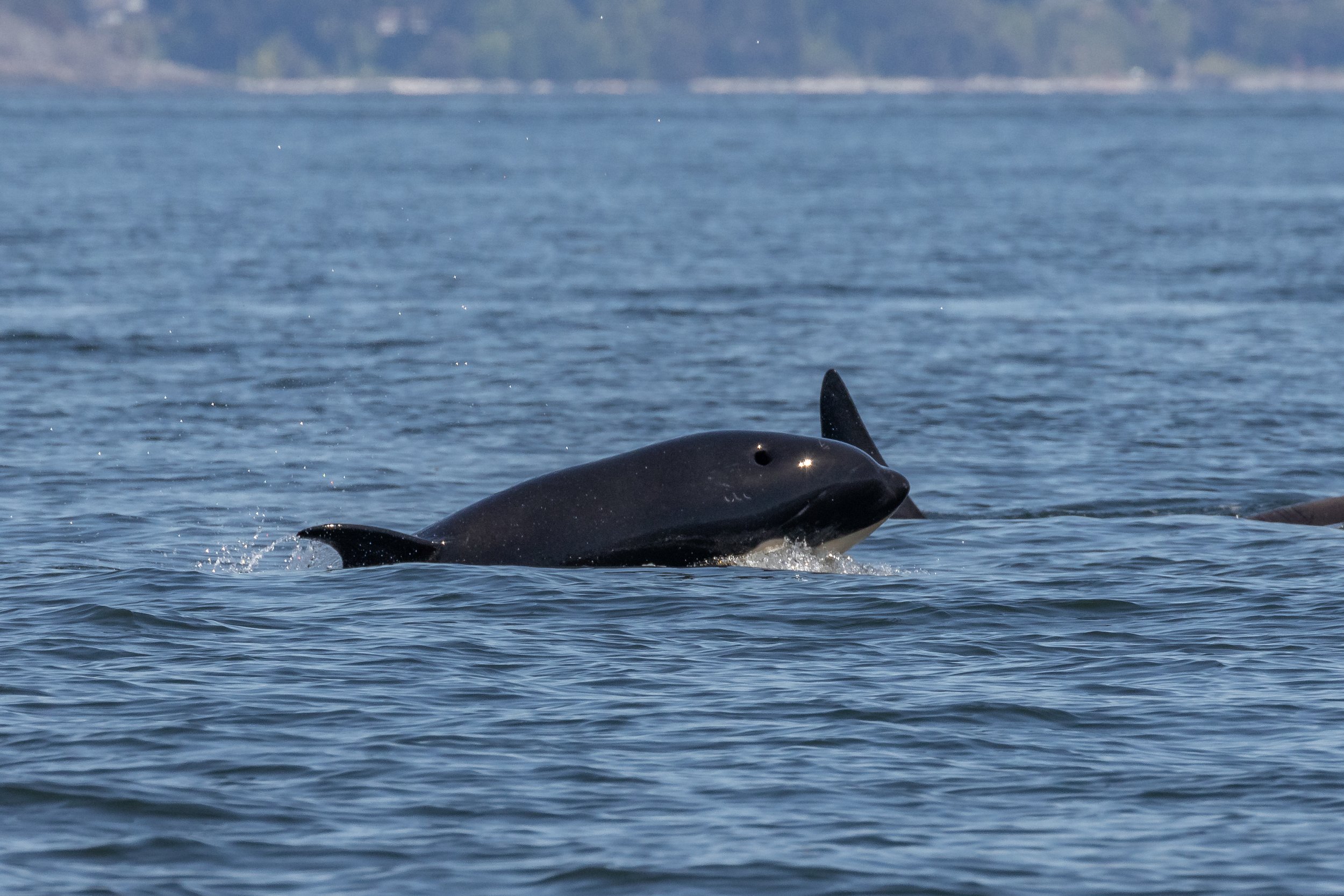May 13, 2023 - T065B's celebrate after lunch
We were fortunate today to receive a report of orcas in the Georgia Strait, from there it was just a matter of finding them. Our captain with their eagle eyes was able to make short work of the search. When our first boat arrived on scene they were greeted by 2 matrilines of orca the T065Bs and the T101s.
T065B Chunk ♀ (1993)
T065B1 Birdsall ♂ (2011)
T065B2 Nettle ♂ (2019)
T065B3 (2023)
T101 Reef ♀ (≤1969)
T101A Rush ♂ (1993)
T101B Lagoon ♂ (1997)
The T101’s and the T065B’s dispersed almost immediately after our arrival. The T101’s appeared to continue north. The T065B’s had other things on their mind, like lunch. Shortly after the dispersal our second boat arrived on scene as well and guests were treated to hunting behaviour. Because most hunting behaviour happens below the surface, we weren’t unable to see what was on the menu. However, we do know that in the end, it was a successful hunt.
When a hunt is successful our orca have a tendency to celebrate and today was no exception. We were so fortunate to watch as the T065B’s picked up speed all while tail slapping, spy hopping and even breaching! T065B3 who is the newest member of the family was particularly happy with a full belly. They breached several times under the watchful eye of Mom Chunk.
We left our orcas to continue their celebration while we headed over to Entrance Island. Not only is this island picturesque with its red and white lighthouse, but it’s also a well-known hangout for our sea lions. We were not disappointed as both our California and Steller sea lions were soaking up the sunshine. Unfortunately for one of our Californians, he was being harassed by the resident lighthouse keepers’ dogs. At 800 pounds, a male California sea lion is not something to be trifled with. Luckily for the dogs, the sea lion was better-mannered and did not retaliate.
We finished the day off by seeing our harbour seals on a haul out close to Gabriola as well as our cormorants at the Gabriola bluffs nesting site.
Today’s photos were taken by Marine Naturalists Vanessa Vereschahen and Aly Kohlman.
Photo by Vanessa Vereschahen.
T101B Lagoon with a young whale beside them. Photo by Vanessa Vereschahen.
Orca look a bit odd from head-on! Photo by Vanessa Vereschahen.
T065B1 Birdsall. Photo by Vanessa Vereschahen.
Photo by Vanessa Vereschahen.
Leftovers for the gulls. Photo by Vanessa Vereschahen.
Photo by Vanessa Vereschahen.
Flukes up! Photo by Vanessa Vereschahen.
Little T065B3 bouncing on mother T065B Chunk’s head. Photo by Vanessa Vereschahen.
T065B1 Birdsall having a better look above the water’s surface. Photo by Vanessa Vereschahen.
Left to right: T065B Chunk, T065B1 Birdsall (back), and T065B3. Photo by Vanessa Vereschahen.
Pecs up! Photo by Vanessa Vereschahen.
Photo by Vanessa Vereschahen.
Photo by Vanessa Vereschahen.
Photo by Vanessa Vereschahen.
Photo by Aly Kohlman.
Photo by Vanessa Vereschahen.
T065B Chunk and family. Photo by Vanessa Vereschahen.
Photo by Aly Kohlman.
Photo by Aly Kohlman.
Photo by Aly Kohlman.
Photo by Vanessa Vereschahen.
Photo by Vanessa Vereschahen.
Photo by Vanessa Vereschahen.
Photo by Vanessa Vereschahen.
Photo by Vanessa Vereschahen.
Pigeon Guillemot. Photo by Vanessa Vereschahen.



























